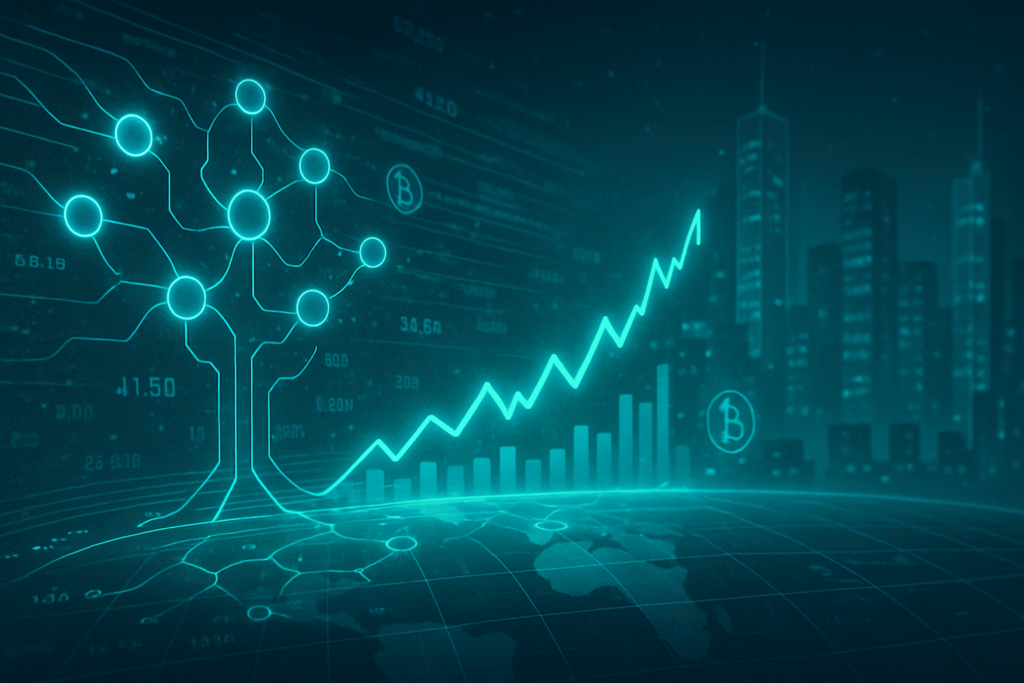
The global financial trading landscape is on the cusp of a profound transformation, driven by the escalating integration of Generative Artificial Intelligence (AI). Industry forecasts for the period between 2025 and 2031 paint a picture of explosive growth, with market projections indicating a significant Compound Annual Growth Rate (CAGR) that will redefine investment strategies, risk management, and decision-making processes across global markets. This 'big move' signifies a paradigm shift from traditional algorithmic trading to a more adaptive, predictive, and creative approach powered by advanced AI models.
As of October 2, 2025, the anticipation around Generative AI's impact on trading is reaching a fever pitch. With market valuations expected to soar from hundreds of millions to several billions of dollars within the next decade, financial institutions, hedge funds, and individual investors are keenly watching as this technology promises to unlock unprecedented efficiencies and uncover hidden market opportunities. The imminent surge in adoption underscores a critical juncture where firms failing to embrace Generative AI risk being left behind in an increasingly AI-driven financial ecosystem.
The Algorithmic Renaissance: How Generative AI Redefines Trading Mechanics
The technical prowess of Generative AI in trading lies in its ability to move beyond mere data analysis, venturing into the realm of data synthesis and predictive modeling with unparalleled sophistication. Unlike traditional quantitative models or even earlier forms of AI that primarily focused on identifying patterns in existing data, generative models can create novel data, simulate complex market scenarios, and even design entirely new trading strategies. This capability marks a significant departure from previous approaches, offering a dynamic and adaptive edge in volatile markets.
At its core, Generative AI leverages advanced architectures such as Generative Adversarial Networks (GANs), Variational Autoencoders (VAEs), and increasingly, Large Language Models (LLMs) to process vast, disparate datasets—from historical price movements and macroeconomic indicators to news sentiment and social media trends. These models can generate synthetic market data that mimics real-world conditions, allowing for rigorous backtesting of strategies against a wider array of possibilities, including rare "black swan" events. Furthermore, LLMs are being integrated to interpret unstructured data, such as earnings call transcripts and analyst reports, providing nuanced insights that can inform trading decisions. The ability to generate financial data is projected to hold a significant revenue share, highlighting its importance in training robust and unbiased models. Initial reactions from the AI research community and industry experts are overwhelmingly positive, emphasizing the technology's potential to reduce human bias, enhance predictive accuracy, and create more resilient trading systems.
Reshaping the Competitive Landscape: Winners and Disruptors in the AI Trading Boom
The projected boom in Generative AI in Trading will undoubtedly reshape the competitive landscape, creating clear beneficiaries and posing significant challenges to incumbents. Major technology giants like Google (NASDAQ: GOOGL), Microsoft (NASDAQ: MSFT), and Amazon (NASDAQ: AMZN), with their extensive cloud computing infrastructure and deep AI research capabilities, are exceptionally well-positioned to capitalize. They provide the foundational AI-as-a-Service platforms and development tools that financial institutions will increasingly rely on for deploying generative models. Their existing relationships with enterprises also give them a significant advantage in offering tailored solutions.
Beyond the tech behemoths, specialized AI startups focusing on financial analytics and quantitative trading stand to gain immense traction. Companies that can develop bespoke generative models for strategy optimization, risk assessment, and synthetic data generation will find a ready market among hedge funds, investment banks, and proprietary trading firms. This could lead to a wave of acquisitions as larger financial institutions seek to integrate cutting-edge AI capabilities. Established fintech companies that can pivot quickly to incorporate generative AI into their existing product suites will also maintain a competitive edge, while those slow to adapt may see their offerings disrupted. The competitive implications extend to traditional financial data providers, who may need to evolve their services to include AI-driven insights and synthetic data offerings.
Broader Implications: A New Era of Financial Intelligence and Ethical Considerations
The widespread adoption of Generative AI in trading fits into the broader AI landscape as a significant step towards truly intelligent and autonomous financial systems. It represents a leap from predictive analytics to prescriptive and generative intelligence, enabling not just the forecasting of market movements but the creation of optimal responses. This development parallels other major AI milestones, such as the rise of deep learning in image recognition or natural language processing, by demonstrating AI's capacity to generate complex, coherent, and useful outputs.
However, this transformative potential also comes with significant concerns. The increasing sophistication of AI-driven trading could exacerbate market volatility, create new forms of systemic risk, and introduce ethical dilemmas regarding fairness and transparency. The "black box" nature of some generative models, where the decision-making process is opaque, poses challenges for regulatory oversight and accountability. Moreover, the potential for AI-generated misinformation or market manipulation, though not directly related to trading strategy generation, highlights the need for robust ethical frameworks and governance. The concentration of advanced AI capabilities among a few dominant players could also raise concerns about market power and equitable access to sophisticated trading tools.
The Road Ahead: Innovation, Regulation, and the Human-AI Nexus
Looking ahead, the near-term future of Generative AI in trading will likely see a rapid expansion of its applications, particularly in areas like personalized investment advice, dynamic portfolio optimization, and real-time fraud detection. Experts predict continued advancements in model explainability and interpretability, addressing some of the "black box" concerns and fostering greater trust and regulatory acceptance. The development of specialized generative AI models for specific asset classes and trading strategies will also be a key focus.
In the long term, the horizon includes the potential for fully autonomous AI trading agents capable of continuous learning and adaptation to unprecedented market conditions. However, significant challenges remain, including the need for robust regulatory frameworks that can keep pace with technological advancements, ensuring market stability and preventing algorithmic biases. The ethical implications of AI-driven decision-making in finance will require ongoing debate and the development of industry standards. Experts predict a future where human traders and AI systems operate in a highly collaborative synergy, with AI handling the complex data processing and strategy generation, while human expertise provides oversight, strategic direction, and ethical judgment.
A New Dawn for Financial Markets: Embracing the Generative Era
In summary, the projected 'big move' in the Generative AI in Trading market between 2025 and 2031 marks a pivotal moment in the history of financial markets. The technology's ability to generate synthetic data, design novel strategies, and enhance predictive analytics is set to unlock unprecedented levels of efficiency and insight. This development is not merely an incremental improvement but a fundamental shift that will redefine competitive advantages, investment methodologies, and risk management practices globally.
The significance of Generative AI in AI history is profound, pushing the boundaries of what autonomous systems can create and achieve in complex, high-stakes environments. As we move into the coming weeks and months, market participants should closely watch for new product announcements from both established tech giants and innovative startups, regulatory discussions around AI in finance, and the emergence of new benchmarks for AI-driven trading performance. The era of generative finance is upon us, promising a future where intelligence and creativity converge at the heart of global trading.
This content is intended for informational purposes only and represents analysis of current AI developments.
TokenRing AI delivers enterprise-grade solutions for multi-agent AI workflow orchestration, AI-powered development tools, and seamless remote collaboration platforms.
For more information, visit https://www.tokenring.ai/.





